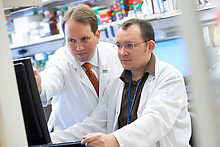Scientists at Memorial Sloan-Kettering have launched a new web-based tool to make information from large-scale genome-sequencing projects easier for researchers to navigate and explore.
The publicly accessible tool — called the cBio Cancer Genomics Portal — empowers cancer biologists and clinicians to translate complex data gathered about gene alterations into new cancer insights and clinical applications, the inventors write in a report published in the May issue of the journal Cancer Discovery.

Gynecologic oncologist Douglas Levine (left) and postdoctoral research fellow Petar Jelinic are using the new web tool to explore genetic changes that occur in ovarian cancer.
“Now scientists can quickly extract the particular slice of information they need from genome databases without having to deal with the bulk of data that isn’t relevant to their research,” explains computational biologist Nikolaus Schultz, who led the development of the cBio Cancer Genomics Portal together with co-author Ethan Cerami. In addition, the resource facilitates the analysis of different types of data and presents the results in graphical summaries.
“Essentially, you can turn spreadsheets with millions of numbers into diagrams that reveal what happens to genes in cancer — without having to be an expert in genome analysis,” Dr. Schultz adds.
Information Overload
Investigators in the field have collaborated nationally and globally in recent years to catalog the myriad genetic changes that occur in tumors. For example, The Cancer Genome Atlas (TCGA) — a genome-sequencing project launched by the National Cancer Institute and the National Human Genome Research Institute in 2006 — is amassing genomic and clinical information from patients with more than 20 types of cancer.
A goal of these types of collaborations is to fast-track the understanding of the basic mechanisms of cancer — for example, by determining how certain alterations in the genome may initiate the formation of tumors, change the behavior of tumors after they have formed, or affect their response to therapy. Such knowledge could ultimately result in better methods to diagnose and control cancers, or prevent the disease from occurring in the first place.
But according to Chris Sander, Chair of the Sloan-Kettering Institute’s Computational Biology Program and one of the report’s authors, the speed of progress is now limited by the complex task of translating massive molecular data into insights that ultimately could benefit patients.
“The amount of detailed information from thousands of tumor samples stored in public genome databases is overwhelming and continues to grow rapidly as the result of national and international efforts,” Dr. Sander explains. When completed, The Cancer Genome Atlas will have mapped the genomes of more than 20,000 tumors, with diverse types of genetic changes documented for each sample.
“The community of cancer researchers is now tackling the challenge of translating the atlas into useful insights about the genes and physiological processes that are rewired in cancer, and the way these changes might affect disease outcome,” Dr. Sander adds.
Bridging a Knowledge Gap
The relationship between genes and cancer is inherently complicated. For example, the function of a gene can be affected by alterations of the DNA sequence, as well as by epigenetic changes, which leave the genetic code unchanged while modifying the activity of genes. Cancer is often the result of a complex mixture of genetic and epigenetic changes occurring in many genes over time.
To date, the new resource provides researchers easy access to five types of changes affecting thousands of cancer-associated genes, which have been mapped out in 17 diseases. The data has been generated by TCGA and by two independent Memorial Sloan-Kettering projects, which provided the first comprehensive analyses of gene changes in prostate cancer and sarcoma. Information generated in additional projects — including those coordinated by the International Cancer Genome Consortium — will soon be included.
“Our tool was designed to bridge a knowledge gap between computational and systems biologists on the one hand, and cancer researchers and disease experts on the other hand,” says Dr. Sander. “The feedback from the scientific community has been very enthusiastic.”
“It’s incredibly rewarding to know that more and more people are using our resource,” adds Dr. Schultz, “and to hear that it’s helping them capture the essence of what happens with the genome in cancer.”
This research was supported by the National Cancer Institute of the National Institutes of Health under award numbers NCI-U24CA143840 and NCI-R21CA135870.
Mskcc.org [en línea] NY (USA): mskcc.org, 05 de julio de 2012 [ref. 21 de junio de 2012] Disponible en Internet: http://www.mskcc.org/news/announcement/new-web-tool-helps-researchers-explore-how-genome-changes




